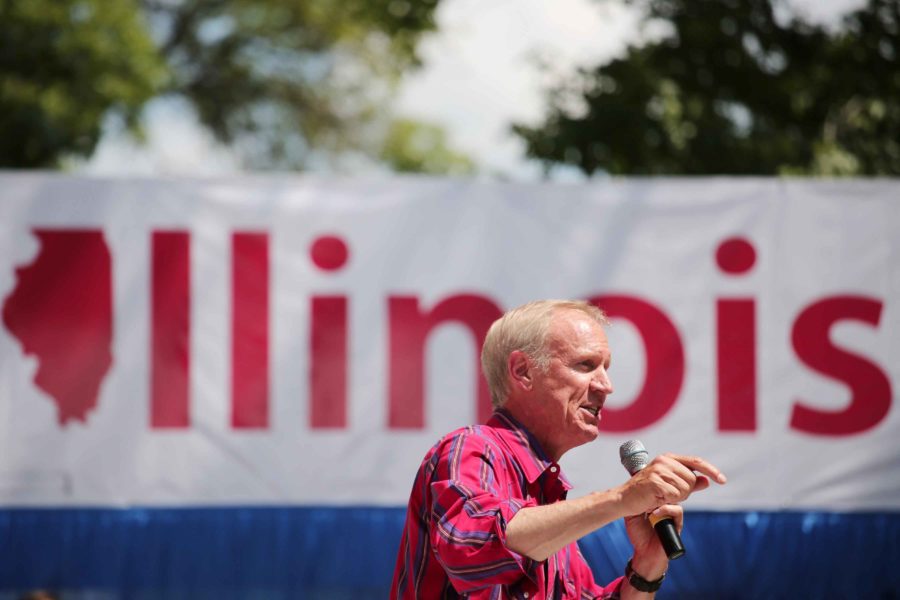Illinois governor calls idea that he’s heartless ‘baloney’
Illinois Gov. Bruce Rauner speaks at the Illinois State Fair on Aug. 17, 2016, in Springfield. (Anthony Souffle/Chicago Tribune/TNS)
October 21, 2016
Illinois Gov. Bruce Rauner fielded some friendly audience questions Monday at the College of DuPage, where he told business people he wants to cut red tape to make Illinois a destination for businesses.
The governor also had to field a budget question. Ines Kutlesa, who runs Guardian Angel Community Services, a Joliet-based organization that serves victims of domestic violence and sexual assault, wanted to know how Rauner planned to solve the state’s budget problems.
Noting that the budget fight at the statehouse had been “dire and catastrophic for nonprofit agencies,” Kutlesa asked Rauner to forecast what he expects next year when a temporary spending measure for state government expires.
Advertisement
Rauner’s response was long-winded but frank.
First, the governor repeated his long-standing pledge that “what I won’t do is raise taxes and have no reforms and no changes. I won’t do it.”
Then he pushed back on what he called “spin . . . that I’m heartless, I don’t care about the most vulnerable.”
“Baloney,” Rauner said. “Many, many of the agencies that have been hurt, including my wife’s work, I personally have donated, I’m a huge supporter, huge advocate. I don’t want to cut your service. I’m just trying to bring some principle and some discipline to the process.”
Next, Rauner said he had offered up a number of reform ideas and was looking for agreement on some combination of those ideas in exchange for a broader budget deal.
“Pick your reforms. I would do it for just a few. How about term limits and fair maps and workers’ comp reform?” Rauner asked. “Pick two or three. I’ve laid out 15. Pick any of them. But let’s pick something.”
In fact, Rauner started out with a list of dozens of ideas but quickly narrowed it down to five — freezing property taxes while allowing local governments to decide what gets collectively bargained, changes to workers’ compensation, changes to the rules governing civil lawsuits, term limits on elected officials and a new way of drawing political maps.
Advertisement*
He’s spent most of his 22 months in office pushing those five items, but also has added fixing the government worker pension system into the mix. It’s his disagreement with Democrats, who control the General Assembly and refuse to grant him legislation relating to the original five items, that has driven the state budget stalemate.
The situation was put on hold this summer when the two sides agreed to authorize enough spending to keep state government functioning until after the Nov. 8 election.
To Kutlesa’s question about what happens after that temporary funding runs out, Rauner offered a dire warning.
“You’re a great spokesperson, because you do wonderful service. God bless you,” Rauner told Kutlesa. “We need to hear from you more. But we also need to hear that — if all we hear is you, pretty soon we don’t have jobs. We need somebody fighting on the other end, and saying, ‘Keep the tax burden reasonable, keep the regulatory burden reasonable and grow our economy.’ Otherwise, we’re never going to fund you, and frankly, there’s going to be more trouble in homes with unemployment. There’s going to be more trouble in homes because of low family incomes. And that’s where we’ve been going for years.”
Rauner continued: “That’s the reason, unfortunately, you’re probably busier than you ought to be. We shouldn’t need your services as much as we do because we’re not growing our economy. And that causes more human services needs. So it’s a vicious cycle that we’re in right now.”
Advertisement








